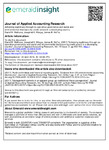Achieving legitimacy through co-operative governance and social and environmental disclosure by credit unions in a developing country

View/
Date
2017Author
Mathuva, David M.
Mboya, Josephat K.
McFie, James B.
Metadata
Show full item recordAbstract
Purpose – The purpose of this paper is to utilize legitimacy theory to test the association between the
governance of credit unions and their social and environmental disclosure in a developing country, Kenya.
A further examination of institutional pressures due to regulatory forces on the association between cooperative governance and credit union social and environmental disclosure (CSED) is performed.
Design/methodology/approach – Using a sample comprising of 1,272 credit union observations over the
period 2008-2013, panel OLS regressions are performed to establish the association between co-operative
governance and CSED. A comparison of the pre- and post-regulatory influences on co-operative governance
and CSED is also performed.
Findings – The findings, which are in support of both legitimacy and institutional theories, depict a positive
and significant association between co-operative governance and CSED. The significance of the co-operative
governance score improves from the pre-regulation period to the post-regulation period. Other significant
variables influencing the volume of CSED by credit unions in Kenya include credit union size and financial
performance as measured by the return on assets.
Research limitations/implications – The study examines CSED practices in a developing country and in
organizations in a single sector. Further, CSED is measured using a self-constructed index with data being
obtained from audited annual reports only.
Practical implications – The study highlights the need to develop CSED guidelines tailored for credit
unions, and a focus on co-operative governance as a way of improving disclosure practices.
Originality/value – The study utilizes a sector-specific governance variable and a CSED index to examine the
association between the two variables by credit unions in a developing country. The study also attempts to
investigate the role of regulation on the association between co-operative governance and the volume of CSED.
